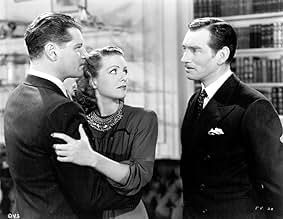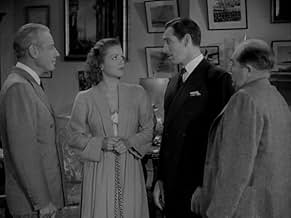James Stephenson(1889-1941)
- Actor
Tall, dapper, oval-faced, crisp-talking British stage actor James Stephenson was born in Yorkshire on April 13, 1889, the son of a chemist and druggist. A bank clerk to begin with, he later pursued a career as a merchant and served with the British Army during World War I. He had no formal acting training, but a growing interest led him to amateur theatre presentations and eventually working professionally on the London and Liverpool stages.
Rather late in life, the 48-year-old Stephenson made his film debut in the British drama The Perfect Crime (1937) at Warner Brothers' Teddington Studios in England. He continued there with the comedy You Live and Learn (1937) and the mystery Mr. Satan (1938). Warner mogul Jack Warner saw much promise in Stephenson and summoned him to Hollywood where he became a studio contract player. Having married Lorna Hewitt Anderson (1908-1967) in 1936, Stephenson left his homeland and emigrated to America, summoning her later once he settled in. They eventually became U.S. citizens in 1938.
During his extremely short stay, the distinguished gent with the clipped tones and neat, sliver mustache indulged himself in urbane villainy in the oily, cultivated tradition of George Sanders and his brother Tom Conway. He proved a reliable support in such films as You Live and Learn (1937), Boy Meets Girl (1938), Nancy Drew: Detective (1938), White Banners (1938), Confessions of a Nazi Spy (1939), You Can't Get Away with Murder (1939), Espionage Agent (1939) and the classic adventures Beau Geste (1939) and The Sea Hawk (1940).
At one point he was entrusted by director William Wyler and mega-star Bette Davis to play the sympathetic role of the family attorney Howard Joyce in the melodrama The Letter (1940). It was the role of a lifetime and he didn't let them down for he earned an Oscar nomination in the process. He had supported Ms. Davis earlier in her dramatic vehicles The Old Maid (1939) and The Private Lives of Elizabeth and Essex (1939).
Stephenson was soon on a roll. Having been handed the role of the titular sleuth in Calling Philo Vance (1939), he was finally first-billed in the above-average "B" movie Shining Victory (1941) when he tragically suffered a myocardial infarction in 1941, dying at age 52 in Pacific Palisades. Having made 40 films in just four years, Hollywood lost a valued, charismatic player. Survived by his wife, James is interred at Forest Lawn Memorial Park in Glendale, California.
Rather late in life, the 48-year-old Stephenson made his film debut in the British drama The Perfect Crime (1937) at Warner Brothers' Teddington Studios in England. He continued there with the comedy You Live and Learn (1937) and the mystery Mr. Satan (1938). Warner mogul Jack Warner saw much promise in Stephenson and summoned him to Hollywood where he became a studio contract player. Having married Lorna Hewitt Anderson (1908-1967) in 1936, Stephenson left his homeland and emigrated to America, summoning her later once he settled in. They eventually became U.S. citizens in 1938.
During his extremely short stay, the distinguished gent with the clipped tones and neat, sliver mustache indulged himself in urbane villainy in the oily, cultivated tradition of George Sanders and his brother Tom Conway. He proved a reliable support in such films as You Live and Learn (1937), Boy Meets Girl (1938), Nancy Drew: Detective (1938), White Banners (1938), Confessions of a Nazi Spy (1939), You Can't Get Away with Murder (1939), Espionage Agent (1939) and the classic adventures Beau Geste (1939) and The Sea Hawk (1940).
At one point he was entrusted by director William Wyler and mega-star Bette Davis to play the sympathetic role of the family attorney Howard Joyce in the melodrama The Letter (1940). It was the role of a lifetime and he didn't let them down for he earned an Oscar nomination in the process. He had supported Ms. Davis earlier in her dramatic vehicles The Old Maid (1939) and The Private Lives of Elizabeth and Essex (1939).
Stephenson was soon on a roll. Having been handed the role of the titular sleuth in Calling Philo Vance (1939), he was finally first-billed in the above-average "B" movie Shining Victory (1941) when he tragically suffered a myocardial infarction in 1941, dying at age 52 in Pacific Palisades. Having made 40 films in just four years, Hollywood lost a valued, charismatic player. Survived by his wife, James is interred at Forest Lawn Memorial Park in Glendale, California.



























